'How far can he take this?': Vasilevskiy's on a GOAT-tier trajectory
Anybody following the NHL is aware of the facts, yet they bear repeating.
Since the start of the 2020 postseason, the Tampa Bay Lightning own an 18-0 record in games following a playoff loss. Andrei Vasilevskiy, the starting goalie in all 18 victories, has also posted a shutout in six of the club's past seven series-clinching contests, allowing one measly goal on 200 shots.
After reading that last paragraph, doesn't your brain hurt, even just a wee bit?
"How is that even possible?" Curtis McElhinney asked rhetorically over the weekend. Yes, even Tampa Bay's backup goalie for the 2020 and 2021 Stanley Cup runs has trouble wrapping his head around the utter dominance.
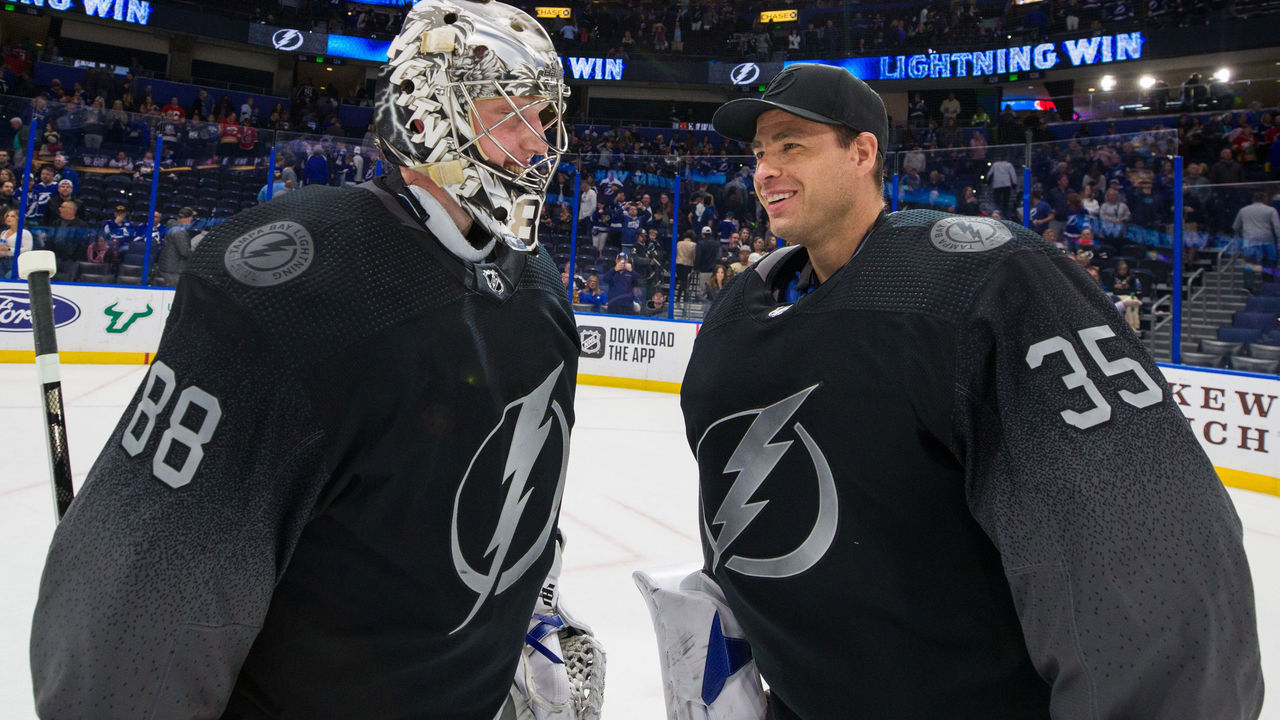
Former NHLer Kevin Weekes, another member of the goaltending fraternity, is equally dumbfounded. This level of excellence and "clutchness" is rare.
"When Dominik Hasek was posting .930, .940 (save percentages) for Buffalo in the '90s, we thought somebody had landed on the moon," Weekes said. "We never thought that high of a save percentage was even possible. That's how crazy, how unprecedented it was. To think of what Vasilevskiy has done in these elimination games ... to me, it's very similar. It's that otherworldly."
As the the New York Rangers get set to host the Lightning on Wednesday in Game 1 of the Eastern Conference Final, let's unpack what makes Vasilevskiy brilliant and look at how he's stacking up to the all-time greats.
Unlike most other NHL goalies, Vasilevskiy was never labeled as a project.
After being selected 19th overall in the 2012 draft, "Big Cat" rode a steady wave toward an NHL job, starring in the top Russian junior league and KHL in consecutive years before moving to North America full time at the age of 20.
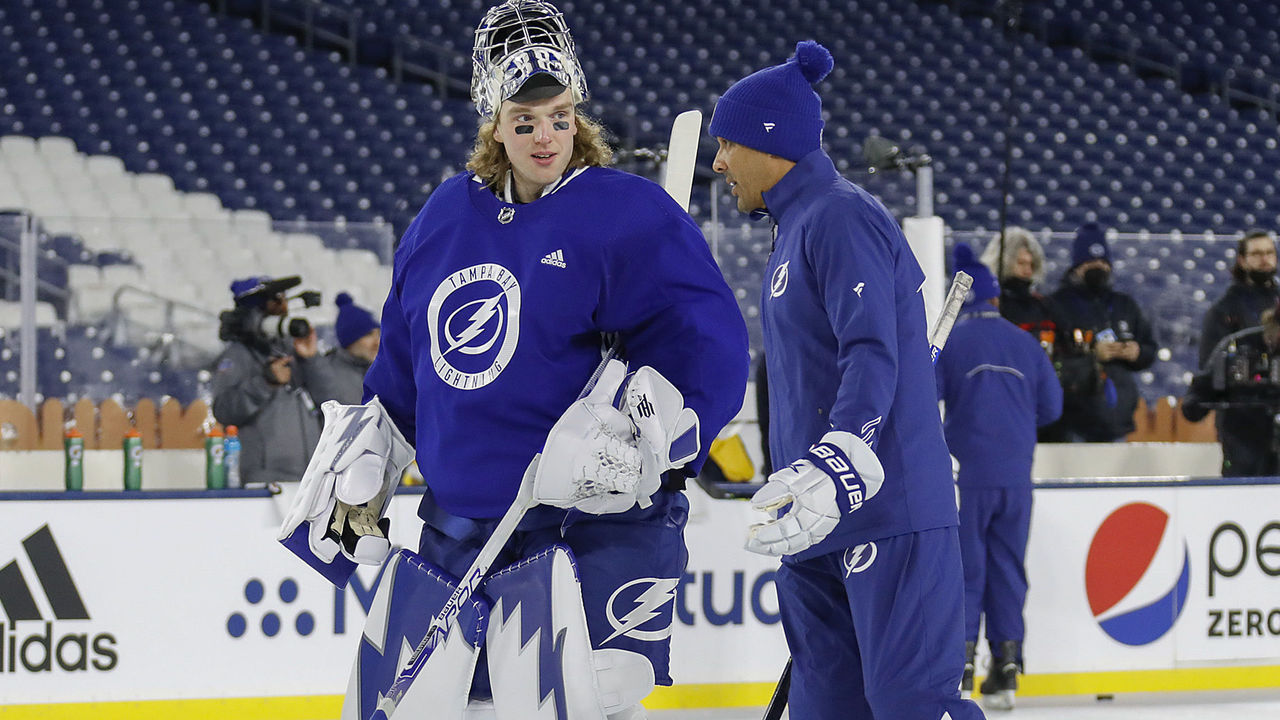
Vasilevskiy arrived at Lightning training camp with a "very advanced" skill set, according to goalie coach Frantz Jean. He was extremely athletic, technically sound, and well on his way to filling out a 6-foot-3, 225-pound frame. The biggest challenge was adjusting to net-front traffic on the smaller ice surface.
"Then there's the maturity part," said Jean, who's coached the junior and pro ranks for three decades. "He's a very fierce competitor, always has been. So for him, when things didn't go well, he tended to take it personally. We had to bring him into that middle ground of not being too high or too low."
For some elite athletes, the middle ground is elusive. For others, it might take until the athlete is into their prime years mentally and physically. Vasilevskiy, Jean said, found it early and, for the most part, in an organic way.
Over a short period, Vasilevskiy got married, became a father, and learned how to compartmentalize through conversations with confidants like Jean.
"He's made unreal growth in that area," Jean said. "I think that's part of the reason why his game has taken such a giant step in the last half-decade."
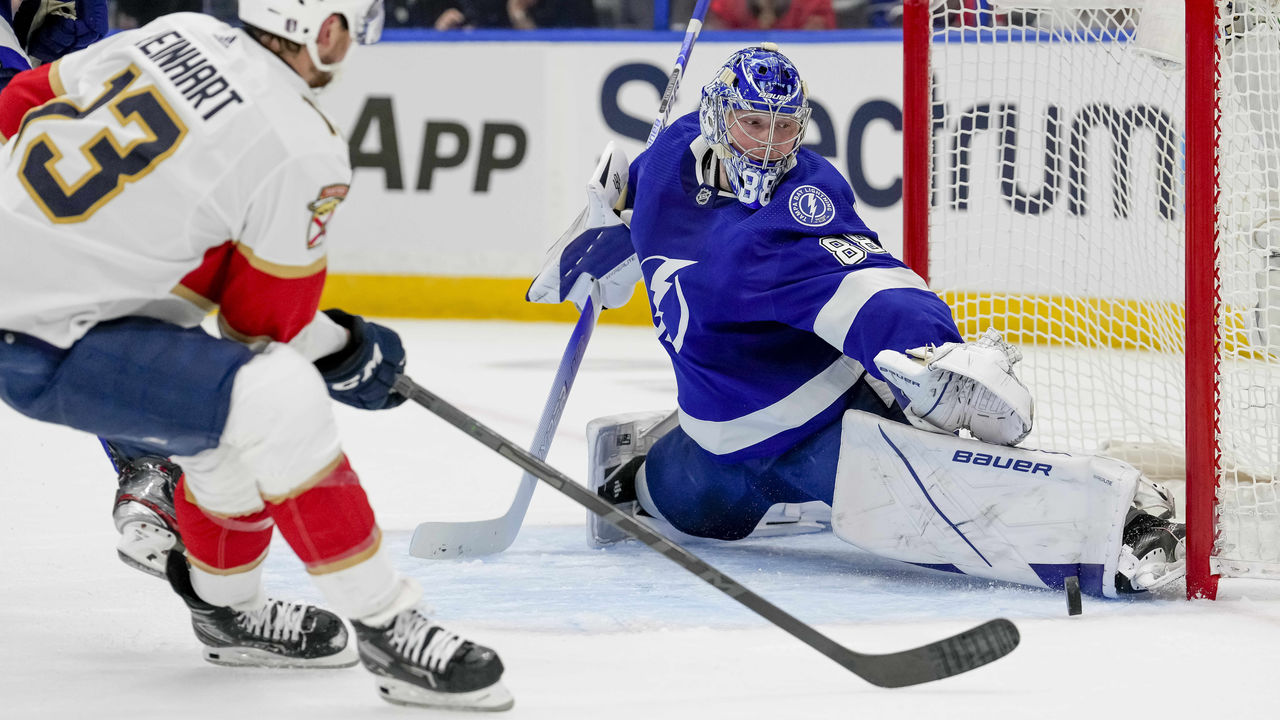
Still only 27, Vasilevskiy has already crafted a Hall of Fame-worthy resume. He's earned one Vezina Trophy, another three Vezina finalist nods, one Conn Smythe Trophy, and two Cups. What's more, he received a league-high 37.4% of votes in a recent NHLPA poll that asked more than 500 NHL players, "If you need to win one game, who's the one goalie you would want on your team?"
Weekes calls him a "unicorn" in one breath and a "five-tool guy" in the next.
"He's not so much doing things his own way, he's doing everything at such a higher level than anybody else," added Martin Biron, the former NHL goalie and longtime analyst for MSG Network. "His lateral movement is at a higher level. His post play is at a higher level. His traffic play, when there's somebody in front of the net, is at a higher level. Everything he does is at a higher level."
The secret sauce to Vasilevskiy's game - particularly in the playoffs when his save percentage leaps to .925 from .919 in the regular season - is having the capacity to park a bad goal or frustrating loss. After all, there's little luck associated with going undefeated in 18 straight contests following a loss or posting a .995 save percentage over seven series-clinching games.
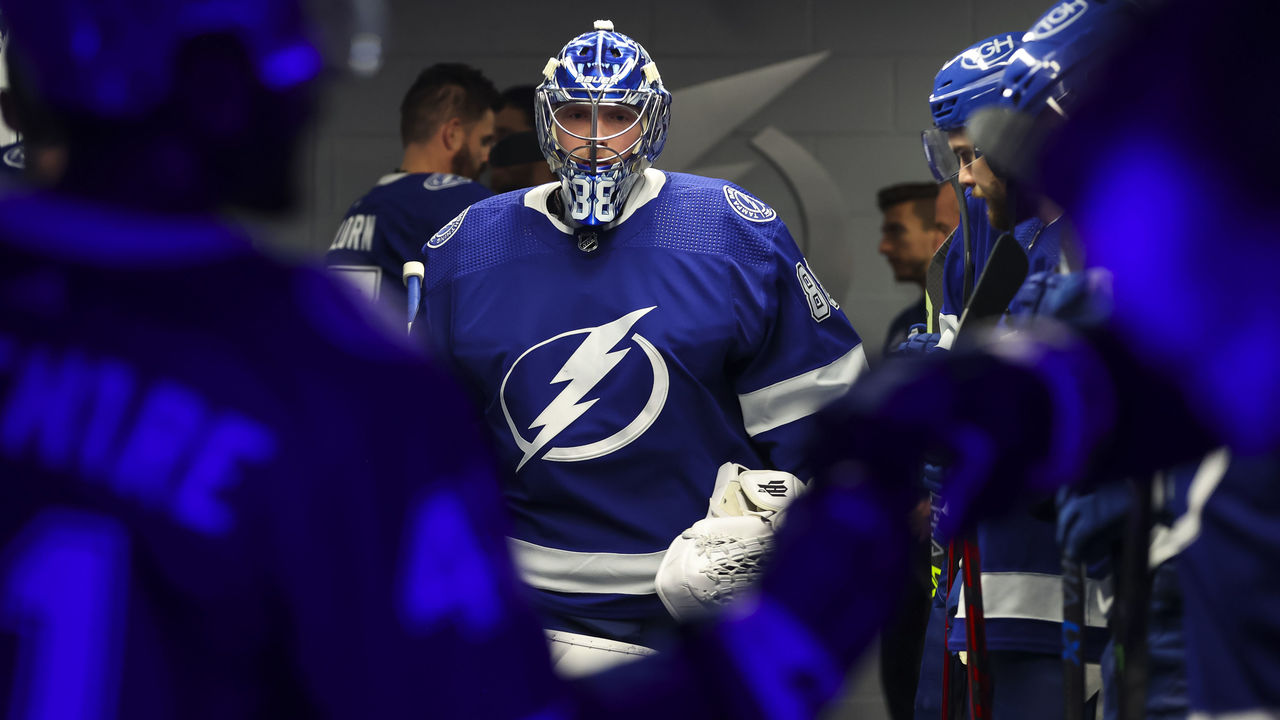
McElhinney witnessed this firsthand a few times, including after the Game 6 overtime loss to the New York Islanders in the 2021 Eastern Conference Final.
"He came into the dressing room, and he was livid. Just livid," McElhinney, who played for eight NHL teams, recalled. "I don't know if he was mad at the guys, in particular, or if he was mad at himself at that moment. But he was pissed. He's slamming stuff around in the dressing room, and I'm just looking at him, thinking, 'Man, he's kind of melting down here. He's pretty upset.' And then we go home to Tampa, and we win that Game 7, 1-0, on a shorthanded goal."
McElhinney chuckles for a second and then picks up his train of thought.
"I'm sitting there, going, 'How the heck did he bottle all of that up, turn it around mentally, and just lock it down the next night?'"
Vasilevskiy never looked completely on track during a 63-game regular season in 2021-22. He finished with a .916 save percentage - well above the league average but not quite up to his own standards. The thought, then, that Vasilevskiy could hit a wall after so much hockey in such a condensed period didn't feel unexpected as he trudged through the first week of the playoffs.
"It's like you almost saw chinks in the armor in the Toronto series. Oh, he looks human here. Toronto seems to have solved the riddle," McElhinney said.
The Lightning escaped the seven-game first-round series against the Maple Leafs despite getting three sub-.900 SV% performances from their superstar goalie. Still, when Game 7 arrived, Vasilevskiy held Toronto to one goal on 31 shots to advance.
"And then, sure enough, the Panthers come to town, and it's lights out."
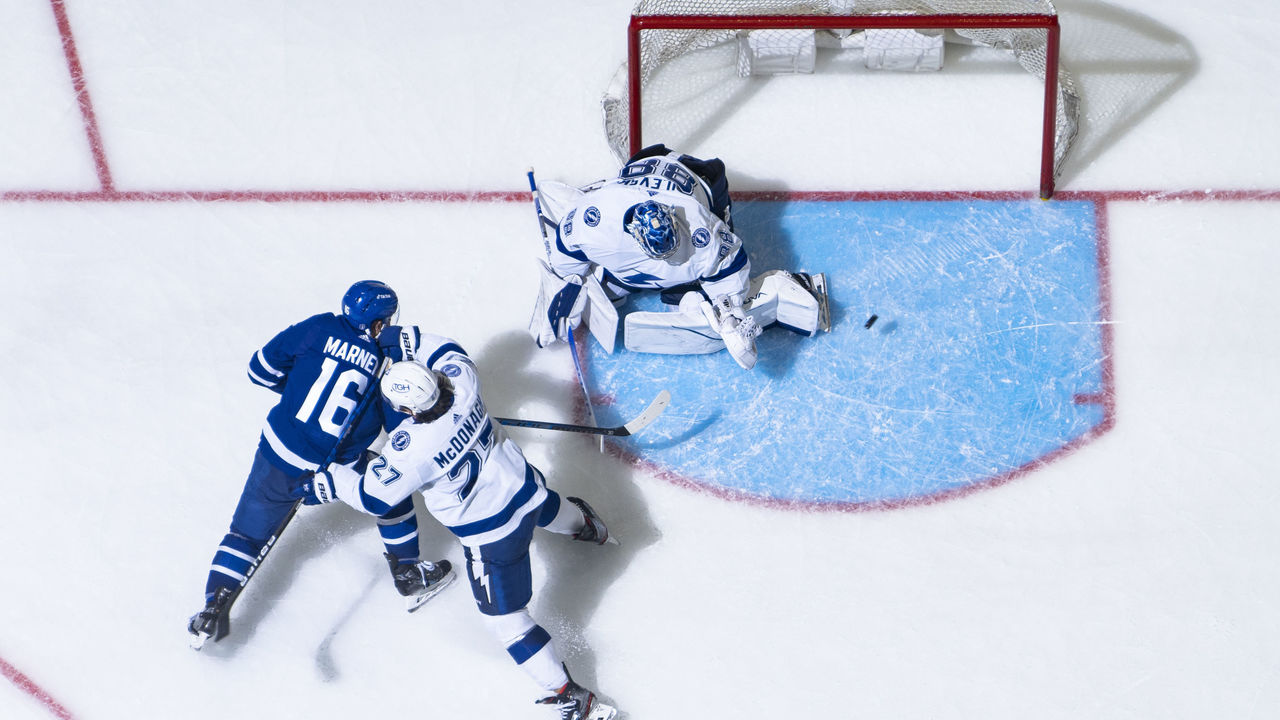
"Lights out" is an appropriate phrase. In the second-round sweep of Florida, Tampa Bay limited the most prolific regular-season offense in 26 years to a mere three goals. As usual, it wasn't a solo effort by Vasilevskiy; no current marriage of goalie and team is in the same hemisphere as far as complementing each other.
As McElhinney framed it, "Wherever the flaws are in Tampa's game, he seems to clean up the mess. If there's any breaks in Vasi's game, well, the high-end forwards and defensemen pick up where he may have missed a beat."
"When people talk about Tampa, they could almost be talking about Vasilevskiy," added Paul Campbell of InGoal Magazine. "Although they have a lot of incredible players and just a deep, strong, skilled team, Vasilevskiy is their foundation. You can track their energy level by tracking his play."
The third round presents a unique challenge. The Lightning are not only game-planning against offensive dynamos such as Artemi Panarin, Mika Zibanejad, Chris Kreider, and Adam Fox but also presumptive Vezina winner Igor Shesterkin.
If, as Shesterkin remarked Monday night, Vasilevskiy is the "the best goalie in the world," the fellow Russian isn't far behind. Shesterkin, a Hart Trophy nominee at 26, has been spectacular in the early stages of his NHL career. This season alone, he's saved an absurd 53.1 goals above expected in 67 regular-season and playoff games, according to Evolving Hockey.
This matchup is the '90s equivalent of Patrick Roy facing off against Martin Brodeur - two truly elite netminders from the same pocket of the world meeting in a late-round playoff series. "Basically goalie porn," InGoal and NHL.com's Kevin Woodley tweeted once the 2022 East finals became official.
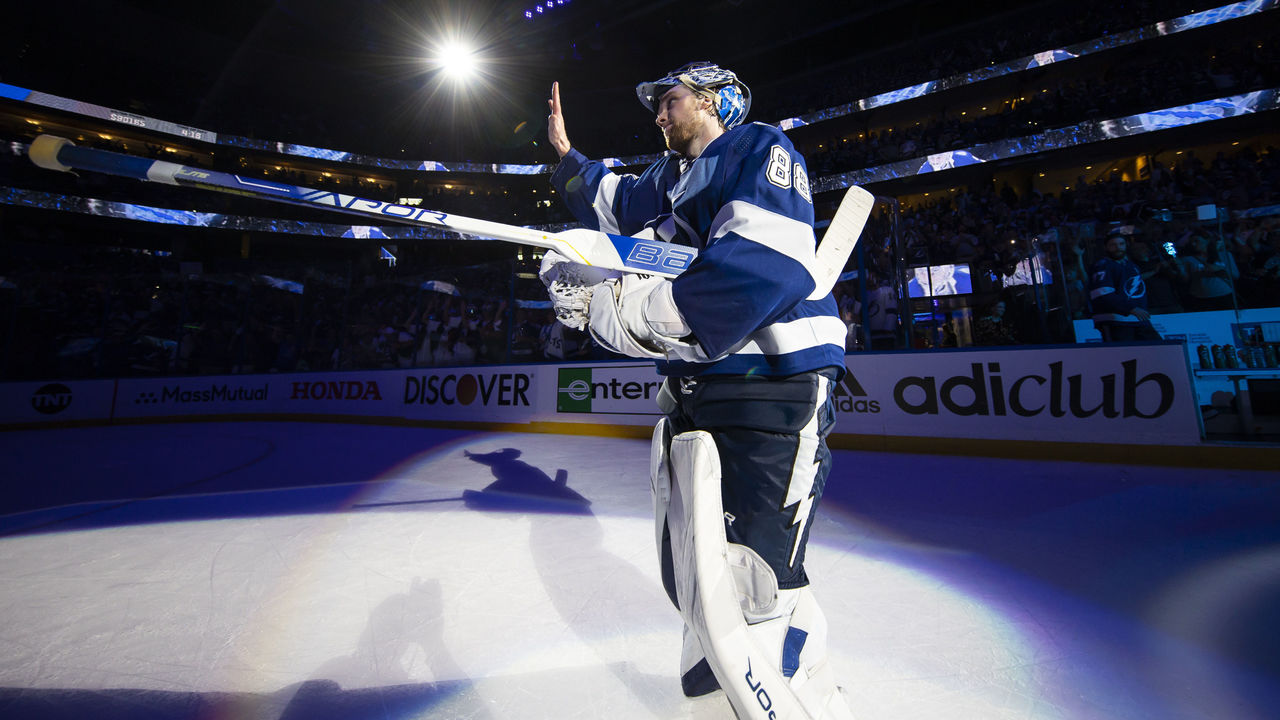
There are absolutely no guarantees the Lightning beat the Rangers, but if they do, Vasilevskiy would be playing in his fourth Cup final in only eight seasons.
"At this point, it's a question of mastery," Campbell said. "How far can he take this? How far can he bring the position and drag everyone else along?"
Former NHL player and coach Rick Tocchet, who is a studio analyst for TNT, already has Vasilevskiy - who, again, is not even 28 - on his Mount Rushmore of goalies alongside Hasek, Roy, and Brodeur. (Glenn Hall, Ken Dryden, Terry Sawchuk, and Jacques Plante also deserve consideration for a spot in the top four. However, the sport and position have changed so much that it's exceedingly difficult to compare.)
Looking strictly at the list of accolades through eight NHL seasons, Vasilevskiy is comfortably on a GOAT-tier trajectory. Over that period, Hasek, who debuted at 26, collected four Vezinas and two Harts; Brodeur picked up the Calder, three Vezina finalist nods, and two Cups; and Roy burst out of the gate with three Vezinas, a fourth Vezina nod, two Conn Smythes, and two Cups.
What ultimately brought Vasilevskiy into the conversation is his single-mindedness. The mental edge. Sports are about winning, and, in Weekes' estimation, Vasilevskiy's clutch gene compares to a few non-hockey icons.
"It's Tiger-esque," he said. "It's Kobe-esque. It's Jordan-esque."
John Matisz is theScore's senior NHL writer. Follow John on Twitter (@MatiszJohn) or contact him via email ([email protected]).